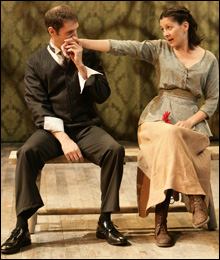
THE CHERRY ORCHARD: A sharp, colloquial, very American translation buoyed by accomplished actors. |
Chekhov insisted that his final masterpiece, The Cherry Orchard, was a comedy and fumed at Stanislavsky’s having his characters suffer through their fraying existences at the pace of a Robert Wilson opus. So you might expect the playwright to present a trophy as big as a samovar to Curt Columbus, whose fleet staging of his own translation of The Cherry Orchard (at Trinity Repertory Company through October 22) is as laden with farce as pathos — though low on cherries in Eugene Lee’s stripped-down set, an assemblage of windowed door frames, dappled drapes, and children’s furniture. And even that is whisked away at the end, as the gentry and their hangers-on mill at the brink of oblivion and the sound of the ax signals pillage and progress amid the beloved trees. Not that all is Keystone Kops as strapped landowner “Lovey” Ranevskaya, her brother Gaev, and their dependents philosophize and make merry while their world slips away. Columbus, who majored in Russian at Yale, has penned a sharp, colloquial, very American translation in which the freed serfs are called what they are: former slaves, at least one of whom, mumbling of the 1861 liberation as “the disaster,” is a no-nonsense old Aunt Tom (the magisterial Barbara Meek as ancient retainer Firs). And Lopakin, the child of slaves who badgers the gentry to save themselves by turning the cherry orchard into cottage plots for “summer people” and in the end does so himself, is played by African-American actor Joe Wilson Jr., whose burst of incredulous triumph as Lopakin realizes that he has bought the big house to which his father and grandfather were not admitted “even through the kitchen” is but the production’s boldest bold move. This splendid actor moves from dazed half-sympathy for the vanquished to irrepressible bounces, then little jumps, falsetto yelps, and near-hysterical command.

Early in the play, Gaev delivers an absurd encomium to a 100-year-old bookcase. Chekhov’s play too has passed the centenary mark and is far worthier of praise than old furniture. Still, Columbus’s broad, sometimes frenetic approach might fail had he less accomplished actors than the vigorous Trinity lot who, like Chekhov, render their characters comical and humane. Phyllis Kay is perhaps too red-blooded for lovelorn blueblood Lovey. But she seems to the manor — and her rich, vivid costumes — born. And she and Brian McEleney, as the garrulous Gaev, nail the Peter Pan in the backward-looking pair. There are good turns, too, by Anne Scurria as German governess Charlotta, whose party tricks mask a need for identity; Fred Sullivan Jr. as neighbor Pishchik, who puts a hand under every turnip he meets, hoping for blood; Stephen Thorne as the obligatory Chekhovian intellectual, dreaming of a finer future; and Emily Young and Crystal Finn as Lovey’s daughters, idealistic and pinched.
The Manhattan socialites of Clare Boothe Luce’s The Women go less the way of the dodo than the way of the divorce court. And in Scott Edmiston’s deliciously deliberate staging for SpeakEasy Stage Company (at the Calderwood Pavilion through October 21), the iconic if seldom revived 1936 satiric drama is painted Jungle Red (its favored nail polish), with a strong dose of the blues. The production doesn’t really make a case for the play as an underappreciated American masterpiece, but it is nonetheless a four-carat hoot with a heart — not to mention bon mots toxic enough to make paint peel. And the audience, familiar with the work from the 1939 film, roots as if it were at a baseball game, with marital idealist Mary Haines the Red Sox and gorgeous golddigger Crystal Allen the Yankees.
The plot is pure soap: Mary, smug about her perfect life and surrounded by distaff barracudas masquerading as friends, discovers that her adored husband (one of the many men who never appear) is cheating with a “shop girl” who is also a “man-trap.” Pride goeth before a divorce — enough marital rending, eventually, to turn Reno into a dude-ranch summer camp for Mary and compatriots — and then the plot must really gust and twist to put things right. Edmiston holds onto the tent poles for the first act, balancing poignance with camp, but not even he can keep the second from exploding into Dynasty ahead of its time.
According to the program, Luce’s play “has been hailed as pre-feminist and condemned as misogynistic” — both of which assessments take the moralistic melodrama with the withering one-liners too seriously. Luce was a woman ahead of her time but nonetheless treading its social waters, and she reports from the surf with more cattiness than polemic. The authorial stand-in, acerb writer Nancy Blake, pronounces on the lives of her well-married friends with a sardonic wit, and SpeakEasy deploys Nancy E. Carroll, the queen of drop-dead deadpan, in the role. Carroll also supplies a piquant touch, leading off a first-act finale that eventually has the ensemble of 20 crooning Cole Porter’s “Down in the Depths on the 90th Floor” (from 1936).